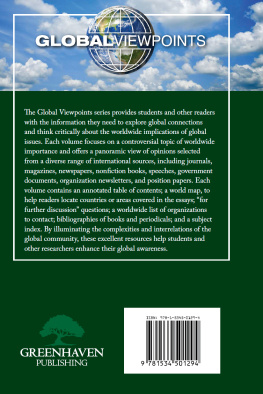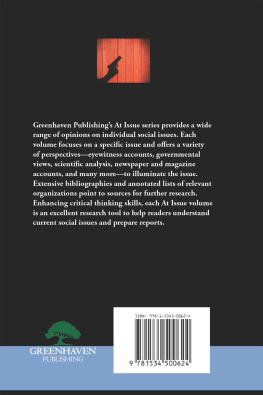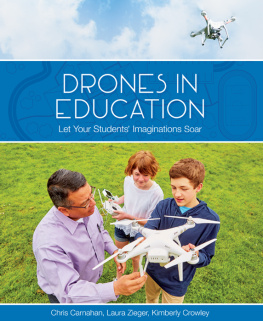Other Books in the Current Controversies Series:
Abortion
Animal Rights
Bullying
College Admissions
Cybercrime
Deadly Viruses
Death Penalty
Genetic Engineering
LGBTQ Rights
Medical Ethics
Privacy and Security in the Digital Age
Professional Football
Racial Profiling
Same-Sex Marriage
Violence Against Women
Published in 2017 by Greenhaven Publishing, LLC
353 3rd Avenue, Suite 255, New York, NY 10010
Copyright 2017 by Greenhaven Publishing, LLC
First Edition
All rights reserved. No part of this book may be reproduced in any form without permission in writing from the publisher, except by a reviewer.
Articles in Greenhaven Publishing anthologies are often edited for length to meet page requirements. In addition, original titles of these works are changed to clearly present the main thesis and to explicitly indicate the authors opinion. Every effort is made to ensure that Greenhaven Publishing accurately reflects the original intent of the authors. Every effort has been made to trace the owners of the copyrighted material.
Cover image: Ivan Cholakov / Shutterstock.com
Library of Congress Cataloging-in-Publication Data
Names: Cunningham, Anne.
Title: Drones, surveillance, and targeted killings / Anne Cunningham.
Description: New York : Greenhaven Publishing, 2017. |
Series: Current controversies | Includes index.
Identifiers: LCCN ISBN 9781534500365 (pbk.) | ISBN 9781534500204 (library bound) Subjects: LCSH: Drone aircraftJuvenile literature. | Air pilots,
MilitaryUnited StatesJuvenile literature.
Classification: LCC UG1242.D7 C75 2017 | DDC 623.7469dc23
Manufactured in the United States of America
Website: http://greenhavenpublishing.com
Foreword
C ontroversy is a word that has an undeniably unpleasant connotation. It carries a definite negative charge. Controversy can spoil family gatherings, spread a chill around classroom and campus discussion, inflame public discourse, open raw civic wounds, and lead to the ouster of public officials. We often feel that controversy is almost akin to bad manners, a rude and shocking eruption of that which must not be spoken or thought of in polite, tightly guarded society. To avoid controversy, to quell controversy, is often seen as a public good, a victory for etiquette, perhaps even a moral or ethical imperative.
Yet the studious, deliberate avoidance of controversy is also a whitewashing, a denial, a death threat to democracy. It is a false sterilizing and sanitizing and superficial ordering of the messy, ragged, chaotic, at times ugly processes by which a healthy democracy identifies and confronts challenges, engages in passionate debate about appropriate approaches and solutions, and arrives at something like a consensus and a broadly accepted and supported way forward. Controversy is the megaphone, the speakers corner, the public square through which the citizenry finds and uses its voice. Controversy is the lifeblood of our democracy and absolutely essential to the vibrant health of our society.
Our present age is certainly no stranger to controversy. We are consumed by fierce debates about technology, privacy, political correctness, poverty, violence, crime and policing, guns, immigration, civil and human rights, terrorism, militarism, environmental protection, and gender and racial equality. Loudly competing voices are raised every day, shouting opposing opinions, putting forth competing agendas, and summoning starkly different visions of a utopian or dystopian future. Often these voices attempt to shout the others down; there is precious little listening and considering among the cacophonous din. Yet listening and considering, too, are essential to the health of a democracy. If controversy is democracys lusty lifeblood, respectful listening and careful thought are its higher faculties, its brain, its conscience.
Current Controversies does not shy away from or attempt to hush the loudly competing voices. It seeks to provide readers with as wide and representative as possible a range of articulate voices on any given controversy of the day, separates each one out to allow it to be heard clearly and fairly, and encourages careful listening to each of these well-crafted, thoughtfully expressed opinions, supplied by some of todays leading academics, thinkers, analysts, politicians, policy makers, economists, activists, change agents, and advocates. Only after listening to a wide range of opinions on an issue, evaluating the strengths and weaknesses of each argument, assessing how well the facts and available evidence mesh with the stated opinions and conclusions, and thoughtfully and critically examining ones own beliefs and conscience can the reader begin to arrive at his or her own conclusions and articulate his or her own stance on the spotlighted controversy.
This process is facilitated and supported in each Current Controversies volume by an introduction and chapter overviews that provide readers with the essential context they need to begin engaging with the spotlighted controversies, with the debates surrounding them, and with their own perhaps shifting or nascent opinions on them. Chapters are organized around several key questions that are answered with diverse opinions representing all points on the political spectrum. In its content, organization, and methodology, readers are encouraged to determine the authors point of view and purpose, interrogate and analyze the various arguments and their rhetoric and structure, evaluate the arguments strengths and weaknesses, test their claims against available facts and evidence, judge the validity of the reasoning, and bring into clearer, sharper focus the readers own beliefs and conclusions and how they may differ from or align with those in the collection or those of classmates.
Research has shown that reading comprehension skills improve dramatically when students are provided with compelling, intriguing, and relevant discussable texts. The subject matter of these collections could not be more compelling, intriguing, or urgently relevant to todays students and the world they are poised to inherit. The anthologized articles also provide the basis for stimulating, lively, and passionate classroom debates. Students who are compelled to anticipate objections to their own argument and identify the flaws in those of an opponent read more carefully, think more critically, and steep themselves in relevant context, facts, and information more thoroughly. In short, using discussable text of the kind provided by every single volume in the Current Controversies series encourages close reading, facilitates reading comprehension, fosters research, strengthens critical thinking, and greatly enlivens and energizes classroom discussion and participation. The entire learning process is deepened, extended, and strengthened.
If we are to foster a knowledgeable, responsible, active, and engaged citizenry, we must provide readers with the intellectual, interpretive, and critical-thinking tools and experience necessary to make sense of the world around them and of the all-important debates and arguments that inform it. We must encourage them not to run away from or attempt to quell controversy but to embrace it in a responsible, conscientious, and thoughtful way, to sharpen and strengthen their own informed opinions by listening to and critically analyzing those of others. This series encourages respectful engagement with and analysis of current controversies and competing opinions and fosters a resulting increase in the strength and rigor of ones own opinions and stances. As such, it helps readers assume their rightful place in the public square and provides them with the skills necessary to uphold their awesome responsibilityguaranteeing the continued and future health of a vital, vibrant, and free democracy.



















